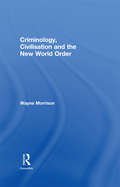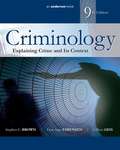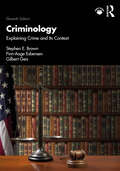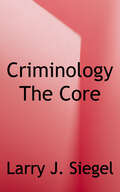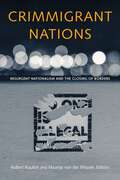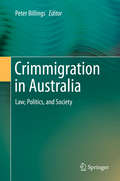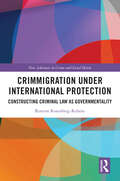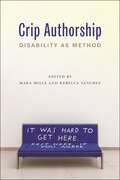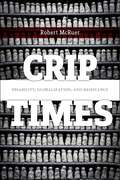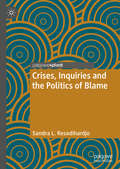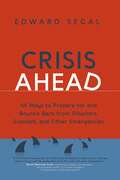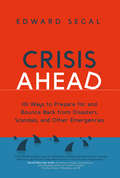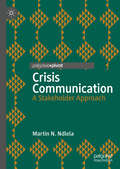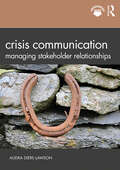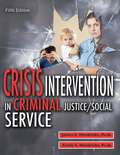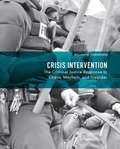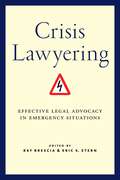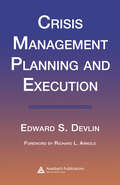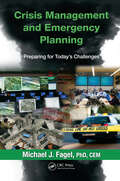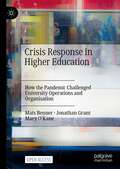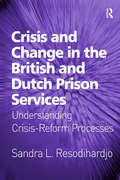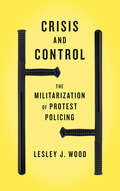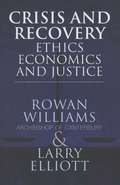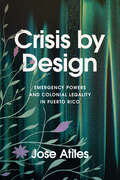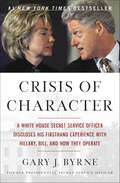- Table View
- List View
Criminology, Civilisation and the New World Order
by Wayne MorrisonExpertly authored by the co-editor of the best-selling text Cultural Criminology Unleashed, this book re-examines criminology in a global context. Wide-ranging and up-to-date, it covers the topics of colonialism and post-colonialism, genocide, state control, the impact of September 11th and the post-9/11 world. Exploring the relationship between a modern discipline and modernity, it reworks the history and composition of criminology in light of September 11th and the prevalence of genocide in modernity. Analizing statistics, anthropology and the everyday assumptions of criminology's history, this text addresses the political and scholarly grip on the territorial state and the absence of a global criminology. Rejecting the prevalent belief that September 11th and the responses it evoked were exceptions that either destroyed or revealed the absence of global legal order, the author argues that, in fact, they confirm the nature of the world order of modernity. A compelling and topical volume, this is a must read for anyone interested or studying in the areas of criminology and criminal justice.
Criminology: Explaining Crime And Its Context (Ninth Edition)
by Finn-Aage Esbensen Gilbert Geis Stephen Eugene BrownCriminology: Explaining Crime and Its Context, Ninth Edition, is a highly acclaimed textbook offering a broad perspective on criminological theory. It provides students of criminology and sociology with a thorough exposure to a range of theories, contrasting their logic and assumptions, but also highlighting efforts to integrate and blend these frameworks. In this ninth edition, the authors have incorporated new directions that have gained traction in the field, while remaining faithful to their criminological heritage. Among the themes in this work are the relativity of crime (its changing definition) with abundant examples, historical roots of criminology and the lessons they have provided, and the strength and challenges of applying the scientific method. This revision offers enhanced coverage of biosocial theories of crime, more global examples, and a new chapter on youth violence, improving on the most comprehensive and balanced theory text available for undergraduates.
Criminology: Explaining Crime and Its Context
by Finn-Aage Esbensen Gilbert Geis Stephen E. BrownCriminology: Explaining Crime and Its Context, Eleventh Edition, offers a broad perspective on criminological theory. It provides students of criminology, criminal justice, and sociology with a thorough exposure to a range of theories about crime, contrasting their logic and assumptions, but also highlighting efforts to integrate and blend these frameworks.In this new edition, the authors have incorporated new directions that have gained traction in the field, while remaining faithful to their criminological heritage. Among the themes in this work are the relativity of crime (its changing definition) with abundant examples, historical roots of criminology and the lessons they have provided, and the strength and challenges of applying the scientific method. This revision offers new chapters on critical theory and on life-course criminology. It is updated throughout to reflect current trends in criminological theory and data.With chapters both updated to reflect recent developments in the field and made easier to digest, this text is essential reading for students of criminology, criminal justice, sociology, and related fields.
Criminology: The Core
by Larry J. SiegelThis book delivers cutting-edge coverage in a succinct, easy-reading paperback. Author Larry Siegel guides you through the fast-paced field of criminology, its most current research, and fascinating examples that help you truly understand criminological theory. <p><p>The text details the crimes of real-life people to illustrate specific criminology theories. Highlighting the interdisciplinary nature of the field, it also offers unbiased coverage of even the most controversial issues -- enabling you to form your own opinions. <p><p>This edition includes the latest insights into political crime; terrorism (e.g. ISIS, lone wolves); white-collar, blue-collar, and green-collar crime; cyber crime; transnational crime (e.g. sex trafficking); and many other topics. In addition, the text is packed with resources like "Thinking Like a Criminologist" role-plays and "Connections" to the big picture to help you maximize your course success.
Crimmigrant Nations: Resurgent Nationalism and the Closing of Borders
by Robert Koulish and Maartje van der WoudeAs the distinction between domestic and international is increasingly blurred along with the line between internal and external borders, migrants—particularly people of color—have become emblematic of the hybrid threat both to national security and sovereignty and to safety and order inside the state. From building walls and fences, overcrowding detention facilities, and beefing up border policing and border controls, a new narrative has arrived that has migrants assume the risk for government-sponsored degradation, misery, and death. Crimmigrant Nations examines the parallel rise of anti-immigrant sentiment and right-wing populism in both the United States and Europe to offer an unprecedented look at this issue on an international level.Beginning with the fears and concerns of immigration that predate the election of Trump, the Brexit vote, and the signing and implementation of the Schengen Agreement, Crimmigrant Nations critically analyzes nationalist state policies in countries that have criminalized migrants and categorized them as threats to national security. Highlighting a pressing and perplexing problem facing the Western world in 2020 and beyond, this collection of essays illustrates not only how anti-immigrant sentiments and nationalist discourse are on the rise in various Western liberal democracies, but also how these sentiments are being translated into punitive and cruel policies and practices that contribute to a merger of crime control and migration control with devastating effects for those falling under its reach. Mapping out how these measures are taken, the rationale behind these policies, and who is subjected to exclusion as a result of these measures, Crimmigrant Nations looks beyond the level of the local or the national to the relational dynamics between different actors on different levels and among different institutions.
Crimmigration in Australia: Law, Politics, and Society
by Peter BillingsThis multidisciplinary book introduces readers to original perspectives on crimmigration that foster holistic, contextual, and critical appreciation of the concept in Australia and its individual consequences and broader effects. This collection draws together contributions from nationally and internationally respected legal scholars and social scientists united by common and overlapping interests, who identify, critique, and reimagine crimmigration law and practice in Australia, and thereby advance understanding of this important field of inquiry.Specifically, crimmigration is addressed and analysed from a variety of standpoints, including: criminal law/justice; administrative law/justice; immigration law; international law; sociology of law; legal history feminist theory, settler colonialism, and political sociology. The book aims to: explore the historical antecedents of contemporary crimmigration and continuities with the past in Australia reveal the forces driving crimmigration and explain its relationship to border securitisation in Australia identify and examine the different facets of crimmigration, comprising: the substantive overlaps between criminal and immigration law; crimmigration processes; investigative techniques, surveillance strategies, and law enforcement agents, institutions and practices uncover the impacts of crimmigration law and practice upon the human rights and interests of non-citizens and their families. analyse crimmigration from assorted critical standpoints; including settler colonialism, race and feminist perspectives By focusing upon these issues, the book provides an interconnected collection of chapters with a cohesive narrative, notwithstanding that contributors approach the themes and specific issues from different theoretical and critical standpoints, and employ a range of research methods.
Crimmigration under International Protection: Constructing Criminal Law as Governmentality (New Advances in Crime and Social Harm)
by Rottem Rosenberg-RubinsBy exploring crimmigration at its intersection with international refugee law, this book exposes crimmigration as a system focused on the governance of territorially present migrants, which internalizes the impracticability of removal and replaces expulsion with domestic policing. The convergence of criminal law and immigration law, known as crimmigration, has become perhaps the paradigmatic model for governing migration in the age of globalization. This book offers a unique way of understanding crimmigration as a system of governmentality, the primary target of which is the population, its principal form of knowledge being political economy, and its essential mechanism being the apparatus of security. It does so by characterizing a particular model of crimmigration, termed ‘crimmigration under international protection’, which targets refugees and asylum-seekers who are principally undeportable under international law. The book draws on comparative research of such models implemented worldwide, combined with a detailed case study of the immigration detention system instigated in Israel for coping with asylum-seekers specifically and exclusively. These models demonstrate that, at its core, crimmigration is not a system of outright social exclusion focused on the expulsion of undesirable migrants, but rather one focused on the management, classification and policing of domestic populations. It is argued that under crimmigration regimes criminal law becomes instrumental in the facilitation of gradual assimilation, by shifting immigration enforcement from the margins of the state to the daily supervision of territorially present migrants. The book illustrates this point by focusing on three main themes: crimmigration as domestication; crimmigration as civic stratification and crimmigration as a mechanism coined by Foucault as the apparatus of security and by Deleuze as the society of control. By exploring these themes, the book offers a comprehensive framework for understanding the rise of crimmigration and the particular ways in which it targets resident migrants. The book will be of interest to researchers and academics working in the areas of criminal law and criminology, immigration law, citizenship studies, globalization studies, border studies and critical refugee studies.
Crip Authorship: Disability as Method
by Mara Mills and Rebecca Sanchez2024 Daniel E. Griffiths Research Award Winner2024 Outstanding Academic Title, given by Choice ReviewsAn expansive volume presenting crip approaches to writing, research, and publishing. Crip Authorship: Disability as Method is an expansive volume presenting the multidisciplinary methods brought into being by disability studies and activism. Mara Mills and Rebecca Sanchez have convened leading scholars, artists, and activists to explore the ways disability shapes authorship, transforming cultural production, aesthetics, and media.Starting from the premise that disability is plural and authorship spans composition, affect, and publishing, this collection of thirty-five compact essays asks how knowledge about disability is produced and shared in disability studies. Disability alters, generates, and dismantles method. Crip authorship takes place within and beyond the commodity version of authorship, in books, on social media, and in creative works that will never be published. The chapters draw on the expertise of international researchers and activists in the humanities, social sciences, education, arts, and design. Across five sections—Writing, Research, Genre/Form, Publishing, Media—contributors consider disability as method for creative work: practices of writing and other forms of composition; research methods and collaboration; crip aesthetics; media formats and hacks; and the capital, access, legal standing, and care networks required to publish. Designed to be accessible and engaging for students, Crip Authorship also provides theoretically sophisticated arguments in a condensed form that will make the text a key resource for disability studies scholars. Essays include Mel Y Chen on the temporality of writing with chronic illness; Remi Yergeau on perseveration; La Marr Jurelle Bruce on mad Black writing; Alison Kafer on the reliance of the manifesto genre on disability; Jaipreet Virdi on public scholarship for disability justice; Ellen Samuels on the importance of disability and illness to autotheory; Xuan Thuy Nguyen on decolonial research methods for disability studies; Emily Lim Rogers on virtual ethnography; Cameron Awkward-Rich on depression and trans reading methods; Robert McRuer on crip theory in translation; Kelsie Acton on plain language writing; and Georgina Kleege on description as an access and aesthetic technique.
Crip Times: Disability, Globalization, and Resistance (Crip #1)
by Robert McRuerContends that disability is a central but misunderstood element of global austerity politics. Broadly attentive to the political and economic shifts of the last several decades, Robert McRuer asks how disability activists, artists and social movements generate change and resist the dominant forms of globalization in an age of austerity, or “crip times.” Throughout Crip Times, McRuer considers how transnational queer disability theory and culture—activism, blogs, art, photography, literature, and performance—provide important and generative sites for both contesting austerity politics and imagining alternatives. The book engages various cultural flashpoints, including the spectacle surrounding the London 2012 Olympic and Paralympic Games; the murder trial of South African Paralympian Oscar Pistorius; the photography of Brazilian artist Livia Radwanski which documents the gentrification of Colonia Roma in Mexico City; the defiance of Chilean students demanding a free and accessible education for all; the sculpture and performance of UK artist Liz Crow; and the problematic rhetoric of “aspiration” dependent upon both able-bodied and disabled figurations that emerged in Thatcher’s England. Crip Times asserts that disabled people themselves are demanding that disability be central to our understanding of political economy and uneven development and suggests that, in some locations, their demand for disability justice is starting to register. Ultimately, McRuer argues that a politics of austerity will always generate the compulsion to fortify borders and to separate a narrowly defined “us” in need of protection from “them.”
Crises, Inquiries and the Politics of Blame
by Sandra L. Resodihardjo“This study probes deeply into the dynamics of the blame games that seem now to have become an inevitable part of advanced societies’ responses to negative events. Resodihardjo’s forensic analysis of how such negative events get framed, investigated and accounted for significantly advances our understanding of how incidents and crises affect the reputations and political capital of public authorities, and how they can foster but also significantly impede institutional learning.”—Paul ’t Hart, Utrecht University, The Netherlands“The crisis is often not even over before the mud starts flying. This little gem of a book outlines causes and consequences of blame games. The author offers strategies for dealing with these blame games. An emerging scholar writing a valuable primer on surviving blame games - warmly recommended!”—Arjen Boin, Leiden University, The Netherlands“This is an important book. Crises are followed by questions and the accountability phase inevitably involves the blame game. In using in-depth case study analysis of tragic incidents at festivals, Sandra Resodihardjo explores why and how blame games start, evolve and are then influenced by a variety of factors. This is a fascinating read, when things go badly wrong the cycle of blame is often complex, involving multiple actors and organisations often battling to frame the event to their own agenda. This should be essential reading not just for scholars studying this critical area of public policy, but practitioners who would undoubtedly learn a lot from the analytical oversight and forensic detail contained in this excellent book.”—Mark Bennister, University of Lincoln, United KingdomDuring the accountability phase following a crisis, the focus is both on learning (how can we prevent a recurrence of this horrific event?) and on finding culprits (who caused and/or contributed to this crisis?). The latter is also known as the blame game where actors receive and respond to blame. Too much focus on the blame game, however, could lead to an unbalanced accountability phase as people are less inclined to share what they know about what happened because of fear, for instance, of resignation. This lack of information hampers the learning process following crises. Hopefully, a better understanding of how blame games work will lead to a better managed blame game which, in turn, should result in a more balanced accountability phase where there is ample of room to learn from the tragic event.This book furthers our understanding of what happens during blame games following crises by looking at both theory and practice. Theories on blame games help to answer questions such as who is blamed and why? How much blame is this person receiving and why? How can this person respond? And why do these responses sometimes not work?One particular response to blame (appointing an inquiry) can have quite an impact on the blame game. That is why the second theoretical chapter addresses questions such as why are inquiries created? How can one influence them? And why are some inquiries more independent than others?The analysis of three festivals gone wrong helps to expand our knowledge of blame games even further. The three cases show that responses to blame can backfire and that rituals, context, and sub-blame games can have an impact on how blame games evolve.Taken together, the theories and cases explored in this book will help people to better understand and manage blame games.
Crisis Ahead: 101 Ways to Prepare for and Bounce Back From Disasters, Scandals, and Other Emergencies
by Edward SegalHow many splashy scandals and crisis situations have befallen companies and public figures in the past week alone? How did the organizations and people at the center of those crises manage the situation? Did they survive with their reputations intact or are they facing an ongoing public nightmare that keeps building on itself in the era of social media?This new book from veteran public relations expert Edward Segal is based on the following premise: it's not a matter of IF a scandal or crisis will hit, it's WHEN. How a company deals with it will have lasting impact on their reputation, profits, and more. But for most organizations, when a crisis hits, they're caught off guard and ill-prepared. While essential, crisis plans are worthless unless properly executed, as the stories and examples featured throughout Crisis Ahead attest. Edward Segal's vivid and memorable accounts underscore the benefits of practicing and updating crisis plans at least once a year. The book also provides a template for creating a customizable crisis management plan.Crisis Ahead is for CEOs, senior staff, corporate communication professionals, HR and legal teams, boards of directors, and front-line employees who need to know what to do in the moment: what levers to pull and what moves to make in real time when faced with a crisis, scandal, or disaster. This book is written with the need for speed in mind. It's concise and practical with a light touch and occasional humor to help people on the front lines prepare for, survive, and bounce back from a crisis. It includes dozens of anecdotes, stories, and lessons about how companies, organizations, and individuals - ranging from Amazon, Apple, and the European Union, to Disney, Starbucks, and entrepreneur Elon Musk - have prepared for, created, managed, and communicated about crisis situations.
Crisis Ahead: 101 Ways to Prepare for and Bounce Back from Disasters, Scandals and Other Emergencies
by Edward SegalHow many splashy scandals and crisis situations have befallen companies and public figures in the past week alone? How did the organizations and people at the center of those crises manage the situation? Did they survive with their reputations intact or are they facing an ongoing public nightmare that keeps building on itself in the era of social media?This new book from veteran public relations expert Edward Segal is based on the following premise: it's not a matter of IF a scandal or crisis will hit, it's WHEN. How a company deals with it will have lasting impact on their reputation, profits, and more. But for most organizations, when a crisis hits, they're caught off guard and ill-prepared. While essential, crisis plans are worthless unless properly executed, as the stories and examples featured throughout Crisis Ahead attest. Edward Segal's vivid and memorable accounts underscore the benefits of practicing and updating crisis plans at least once a year. The book also provides a template for creating a customizable crisis management plan.Crisis Ahead is for CEOs, senior staff, corporate communication professionals, HR and legal teams, boards of directors, and front-line employees who need to know what to do in the moment: what levers to pull and what moves to make in real time when faced with a crisis, scandal, or disaster. This book is written with the need for speed in mind. It's concise and practical with a light touch and occasional humor to help people on the front lines prepare for, survive, and bounce back from a crisis. It includes dozens of anecdotes, stories, and lessons about how companies, organizations, and individuals - ranging from Amazon, Apple, and the European Union, to Disney, Starbucks, and entrepreneur Elon Musk - have prepared for, created, managed, and communicated about crisis situations. p.p1 {margin: 0.0px 0.0px 0.0px 0.0px; font: 12.0px 'Helvetica Neue'; color: #454545}
Crisis Communication: A Stakeholder Approach
by Martin N. NdlelaThis timely book explores crises as an inevitable part of modern society, which causes ramifications not only for organisations, but also for a diverse range of stakeholders. Addressing the need for organisations to be guided by a stakeholder-oriented approach throughout all phases of the crisis communication process, the author draws upon various business disciplines and covers the management of issues, risk, reputation and relationships. Covering all stages of crisis communication, from pre-crisis to post-crisis, stakeholder engagement is analysed through a series of case studies, with a particular focus on the role of social media. Scholars of corporate communications and business strategy will find this new book undoubtedly useful, and it will be of particular interest to those involved in crisis communication and management.
Crisis Communication: Managing Stakeholder Relationships
by Audra Diers-LawsonCrises come in many shapes and sizes, including media blunders, social media activism, extortion, product tampering, security issues, natural disasters, accidents, and negligence – just to name a few. For organizations, crises are pervasive, challenging, and catastrophic, as well as opportunities for organizations to thrive and emerge stronger. Despite the proliferation of research and books related to crisis communication, the voice that is often lost is that of the stakeholder. Yet, as both a public relations and management function, stakeholders are central to the success and failure of organizations responding to and managing crises in a cross-platform and global environment. This core textbook provides a comprehensive and research-driven introduction to crisis communication, critical factors influencing crisis response, and what we know about predicting stakeholder responses to crises. Incorporated into each chapter are global case studies, ethical challenges, and practitioner considerations. Online resources include an extensive set of multimedia materials ranging from podcast mini-lectures to in-class exercises, and simulation-based activities for skills development (https://audralawson.com/resources/crisis-communication-managing-stakeholder-relationships/). Demonstrating the connection between theory, decision-making, and strategy development in a crisis context, this is a vital text for advanced undergraduate and postgraduate students of Communications, Public Relations, Marketing, and Strategic Management.
Crisis Intervention In Criminal Justice/Social Service (Fifth Edition)
by James E. Hendricks Cindy S. HendricksThis expanded new edition continues to demonstrate and provide theoretical, analytical, and practical knowledge for first responders. Face-to-face interaction with the client/victim is part of the comprehensive approach advocated by the book, which requires interveners to assess the nature of a crisis and the condition of the victim in order to determine the appropriate course of action. The comprehensive balance of theory and practice presented in this book should enable the intervener in coupling his/her general knowledge of human psychology and emotional crisis with the specific and novel characteristics of various crisis situations. The text represents the work of national scholars who have expertise in criminal justice and social service issues. Their chapters focus on a Historical and Theoretical Overview, Ethics in Crisis Intervention Practice, Intimate Partner Violence, Police Response to Domestic Violence, Children in Crisis, Elder Mistreatment, Suicide, Crisis of Rape and Survivor Intervention, Death Notification and the Theory and Practice of Delivering Bad News, Terrorism and Crisis Intervention, and Mass Casualty Crisis Response and Communication. Helpful appendices in each chapter provide additional internet resources, as well as a complete Model Law Enforcement Code of Ethics and Social Work Code of Ethics. This new edition retains important information while providing current case studies such as the "Miracle on the Hudson River" crash, the mass shootings at Virginia Tech, the Boston Marathon bombing, and the Yarnell Hill fire in Arizona. This exceptional book is designed for firefighters, police officers, community service officers, correctional workers, emergency medical workers, probation/parole officers, protective service workers, psychological counselors, social workers, and victim assistance workers among others.
Crisis Intervention: The Criminal Justice Response to Chaos, Mayhem, and Disorder
by William M. Harmening Douglas CraigCrisis Intervention: The Criminal Justice Response to Chaos, Mayhem, and Disorder introduces readers to the methods and techniques of crisis intervention employed by police and correctional officers. Rather than focusing on abstract theories, this text presents real-life situations first and then explores the theories and methods relevant to those situations. It goes beyond the simple presentation of facts and incorporates best practices of policing and other topics usually found only in police training manuals. The text also examines the psychological effects of crisis on criminal justice professionals and ethical considerations related to crisis response.
Crisis Lawyering: Effective Legal Advocacy in Emergency Situations
by Eric K. Stern Ray BresciaShines a light on the emerging field of law dedicated to responding to and resolving the crises of the twenty-first centuryIn an increasingly globalized world, a complex and interlocking web of nations, governments, non-state actors, laws, and rules affect human behavior. When crisis hits—whether that be extrajudicial detention, unprompted deportation, pandemics, or natural disasters—lawyers are increasingly among the first responders, equipped with the knowledge necessary to navigate the regulations of this ever more complex world.Crisis Lawyering explores this phenomenon and attempts to identify and define what it means to engage in the practice of law in crisis situations. In so doing, it hopes to sketch out the contours of the emerging field of crisis lawyering. Contributors to this volume explore cases surrounding domestic violence; dealing with immigrants in detention and banned from travel; policing in Ferguson, Missouri; the kidnapping of journalists; and climate change, among other crises. Their analysis not only serves as guidance to lawyers in such situations, but also helps others who deal with crises understand those crises—and the role of lawyers in them—better so that they may respond to them more effectively, efficiently, collaboratively and creatively. Crisis Lawyering shines a light on the emerging field of law dedicated to responding to and resolving the complex crises of the twenty-first century.
Crisis Management Planning and Execution
by Edward S. DevlinCrisis management planning refers to the methodology used by executives to respond to and manage a crisis and is an integral part of a business resumption plan. Crisis Management Planning and Execution explores in detail the concepts of crisis management planning, which involves a number of crises other than physical disaster.Defining th
Crisis Management and Emergency Planning: Preparing for Today's Challenges
by Michael J. FagelEmergency managers and officials have seen a tremendous increase in the planning responsibilities placed on their shoulders over the last decade. Crisis Management and Emergency Planning: Preparing for Today's Challenges supplies time-tested insights to help communities and organizations become better prepared to cope with natural and manmade disas
Crisis Response in Higher Education: How the Pandemic Challenged University Operations and Organisation
by Jonathan Grant Mats Benner Mary O’KaneThis open access book explores the impact of Covid-19 on universities, and how students, staff, faculty and academic leaders have adapted to and dealt with the impact of the pandemic. Drawing on experiences from Britain, Australia and Sweden, it showcases how Covid has challenged routines and procedures in universities, and thrown them into a disarray of ever-changing events and short-term adaptations. The authors pay particular attention to how students, staff, faculty, and leaders have coped with Covid, through a series of autobiographical portraits of their strains but also heroic efforts in the harshest of circumstances. This important book explores the exceptional ramifications of the pandemic but also how universities may contribute to a fairer and more robust society and concludes with a set of prescriptions for universities that aim to be proactive and resilient forces in society. It will be of interest to scholars interested in higher education, governance and organizational studies.This is an open access book.
Crisis and Change in the British and Dutch Prison Services: Understanding Crisis-Reform Processes
by Sandra L. ResodihardjoWhat happens when incidents result in a policy sector losing its legitimacy? When a malfunctioning policy sector receives so much negative public attention that it has to fight for its survival? This study describes three such cases in detail within the British and Dutch Prison Services, examining the incidents, the negative response of the media and Members of Parliament to these incidents, and the way in which policy-makers tried to deal with the crises. This book establishes under which conditions such crises led to reform.
Crisis and Control: The Militarization of Protest Policing
by Lesley J. WoodCrisis and Control explains how neoliberal shifts in political and economic systems are militarizing the policing of protest. The book offers a way to understand the influence of political processes on police practices and provides an empirical study of militarized protest policing from 1995 until the present. Lesley J. Wood shows how protest policing techniques have become more militarised and more dependent on intelligence gathering over the past fifteen years partly as a result of the neoliberal restructuring political, economic and social processes. On an increasingly integrated and tumultuous globe, new militarized technologies, formations and frameworks are diffusing quickly through policing networks. Crisis and Control uses novel theoretical and methodological approaches and a unique range of empirical data to make an important and radical contribution to a growing field.
Crisis and Recovery
by Rowan Williams Larry ElliottDuring the ongoing global financial crisis, a lack of moral and ethical leadership in society has been exposed. The Most Reverend Rowan Williams, Archbishop of Canterbury and Larry Elliott, The Guardian , bring together their thoughts on the issues of ethics and morality in business, with contributions from leading business figures.
Crisis by Design: Emergency Powers and Colonial Legality in Puerto Rico
by Jose AtilesDevastating hurricanes, deteriorating infrastructure, massive public debt, and a global pandemic make up the continuous crises that plague Puerto Rico. In the last several years, this disastrous escalation has placed the archipelago more centrally on the radar of residents and politicians in the United States, as the US Congress established an oversight board with emergency powers to ensure Puerto Rico's economic survival—and its ability to repay its debt. These events should not be understood as a random string of compounding misfortune. Rather, as demonstrated by Jose Atiles in Crisis by Design, they result from the social, legal, and political structure of colonialism. Moreover, Atiles shows how administrations, through emergency powers and laws paired with the dynamics of wealth extraction, have served to sustain and exacerbate crises. He explores the role of the local government, corporations, and grassroots mobilizations. More broadly, the Puerto Rican case provides insight into the role of law and emergency powers in other global south, Caribbean, and racialized and colonized countries. In these settings, Atiles contends, colonialism is the ongoing catastrophe.
Crisis of Character: A White House Secret Service Officer Discloses His Firsthand Experience with Hillary, Bill, and How They Operate
by Gary J. ByrneIn this runaway #1 New York Times bestseller, former secret service officer Gary Byrne, who was posted directly outside President Clinton's oval office, reveals what he observed of Hillary Clinton's character and the culture inside the White House while protecting the First Family in CRISIS OF CHARACTER, the most anticipated book of the 2016 election.
